Overview
The title "9 Key Approaches to Bipolar Disorder Supportive Therapy" invites us to explore effective strategies for supporting individuals living with bipolar disorder. This article gently outlines several tailored approaches, including:
- Individualized treatment plans
- Mindfulness practices
- Community resources
By emphasizing personalized and comprehensive care, we can significantly enhance emotional regulation, symptom management, and overall recovery outcomes for those affected by bipolar disorder.
Have you ever felt overwhelmed by your emotions? It's essential to recognize that you are not alone in this journey. The strategies discussed here are designed to provide nurturing support and understanding, guiding you towards a path of healing. As we explore this further, let’s consider how these approaches can foster a sense of safety and connection in your life.
In addition to individualized plans, mindfulness practices can offer a gentle way to cultivate awareness and emotional balance. By incorporating community resources, we can create a supportive network that empowers individuals to thrive. Remember, seeking help is a courageous step, and every journey towards recovery is unique. Together, we can find the right approach that resonates with your personal experience.
Introduction
In the complex landscape of bipolar disorder treatment, The Emerald Couch shines brightly by offering a holistic approach that prioritizes individualized care and community support. Have you ever felt overwhelmed by your mental health journey? Recognizing that each client's experience is unique, therapists here develop tailored treatment plans that weave together mindfulness practices, medication management, and family involvement.
This comprehensive strategy not only addresses the specific challenges faced by individuals with bipolar disorder but also cultivates a nurturing environment where healing can flourish. By emphasizing the importance of psychoeducation and group therapy, The Emerald Couch empowers clients and their families to navigate the intricacies of this condition, ultimately reinforcing resilience and promoting long-term recovery.
As we explore this further, it's essential to acknowledge that our understanding of bipolar disorder is continually evolving. So too is our commitment to providing effective, compassionate care that resonates with the diverse experiences of those affected. Together, we can embark on a journey toward healing and understanding.
The Emerald Couch: Tailored Supportive Therapy for Bipolar Disorder
At The Emerald Couch, we embrace a caring and personalized approach to bipolar disorder supportive therapy, recognizing that each individual's journey is unique. Through comprehensive assessments, our therapists develop tailored treatment plans that incorporate bipolar disorder supportive therapy to address the complexities of bipolar disorder. This customized approach not only tackles the distinct challenges faced by individuals but also incorporates bipolar disorder supportive therapy to foster a safe environment for exploring feelings and experiences.
Have you ever felt overwhelmed by your past? Such an environment is essential for fostering healing and resilience, as it enables individuals to actively participate in their recovery journey through bipolar disorder supportive therapy. In our counseling sessions, we incorporate mindfulness techniques, such as meditation and conscious breathing, to enhance emotional regulation and self-awareness. This allows individuals to observe their thoughts and feelings without judgment.
Research indicates that personalized therapy can significantly improve adherence to care. In fact, attending support group meetings can raise the likelihood of following through with care by approximately 86%. At The Emerald Couch, we facilitate access to support groups, ensuring individuals have the community assistance necessary for their recovery.
Moreover, understanding the genetic factors linked to bipolar disorder can aid in early detection and intervention. We integrate this knowledge into our care strategies, highlighting the importance of personalized support. Our therapists also inform individuals about potential medication side effects, which is a crucial aspect of personalized treatment plans.
By focusing on each individual's unique requirements and incorporating mindfulness methods, The Emerald Couch exemplifies contemporary best practices in bipolar disorder supportive therapy, ensuring effective symptom management and promoting long-term wellness. Establishing a trusting therapeutic connection is vital, as this foundation enables individuals to feel secure in sharing their experiences, including any stigma they may encounter regarding treatment.
As we explore this further, remember that you are not alone on this journey. Seeking help is a courageous step towards healing.
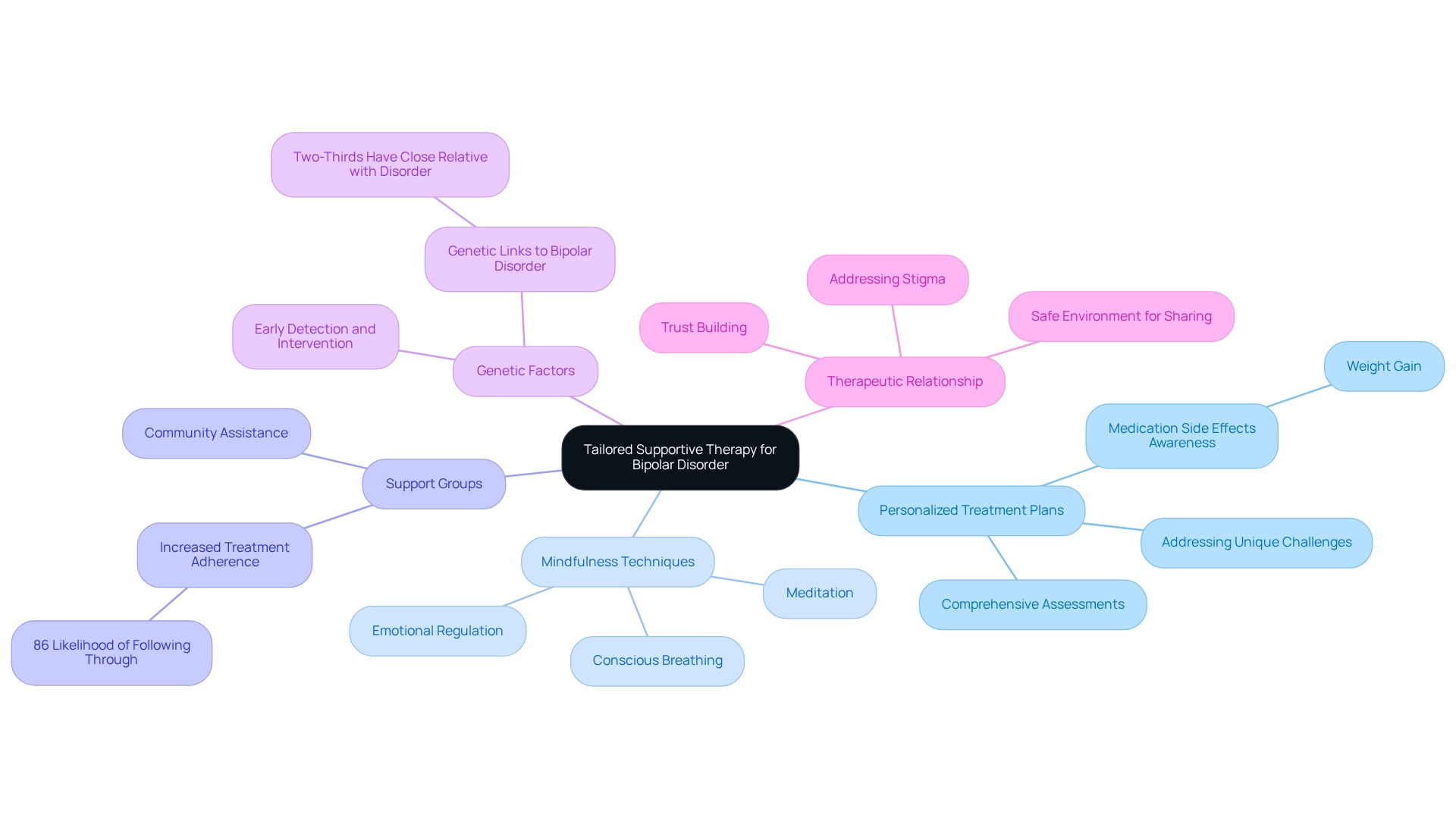
Group Therapy: Building Community and Understanding for Bipolar Disorder
Group support at The Emerald Couch offers a crucial platform for individuals participating in bipolar disorder supportive therapy to connect in a nurturing environment. Have you ever felt overwhelmed by your past? Participants engage in sharing their experiences, challenges, and coping strategies, which cultivates a strong sense of community and mutual understanding. This collaborative approach significantly alleviates feelings of isolation, allowing individuals to learn from each other and develop enhanced coping skills and emotional resilience.
Facilitated by trained therapists, these sessions ensure that discussions remain constructive and that a safe space is maintained for all members. The Emerald Couch is dedicated to dismantling the stigma associated with counseling, promoting a non-judgmental environment where clients can feel at ease discussing their challenges. Research indicates that group sessions can be particularly effective, with participants often reporting improved outcomes in managing their symptoms. Notably, a study found that participants scored below the clinical threshold for significant depression, mania, or anxiety symptoms at baseline, highlighting the potential benefits of group therapy in symptom management. Furthermore, a study on psychoeducation compared to peer support revealed that although organized group psychoeducation was not more clinically effective than peer support, it was more favored by participants and advantageous for those with fewer prior episodes of the condition. This highlights the significance of early organized interventions in the management of mood disorders.
As we explore this further, the dynamic nature of group sessions fosters a sense of belonging, which is essential for individuals navigating the complexities of bipolar disorder supportive therapy. As therapists modify their methods to involve participants actively, particularly in virtual environments, the efficacy of these sessions keeps progressing, establishing them as a vital element of holistic care plans. The Emerald Couch provides adaptable counseling options, including in-person and virtual appointments, ensuring that clients can access the support they need in a manner that suits their lifestyle. As highlighted by treatment specialists at Banyan Mental Health, "Our group sessions are structured to assist individuals in handling their symptoms and attaining enduring recovery." By prioritizing community support, The Emerald Couch provides bipolar disorder supportive therapy, empowering individuals to visualize a path toward recovery and reinforcing the notion that they are not alone in their journey.
In addition to supporting individuals with bipolar disorder, The Emerald Couch recognizes the unique challenges faced by parents, particularly those experiencing postpartum difficulties. Group sessions can also provide a supportive environment for these parents, enabling them to share their experiences and receive advice customized to their specific needs. To engage in group therapy, individuals are encouraged to reach out to local mental health practices or online platforms that offer supportive group sessions tailored to their needs.
Medication Management: Essential Component of Bipolar Disorder Support
Effective medication management is a cornerstone of bipolar disorder supportive therapy for individuals dealing with bipolar disorder. At The Emerald Couch, our therapists provide bipolar disorder supportive therapy by working closely with individuals and their prescribing physicians to monitor the effectiveness of medications and make necessary adjustments. This partnership is essential for ensuring that individuals receive bipolar disorder supportive therapy, which includes appropriate medications to stabilize their moods and reduce the risk of manic or depressive episodes.
Have you ever felt uncertain about your treatment plan? During the initial intake session, we collect vital information to collaboratively create a personalized plan that reflects what success appears and feels like for each individual. Regular check-ins and open communication regarding medication side effects and effectiveness are crucial elements of this process, fostering a comprehensive care strategy that includes bipolar disorder supportive therapy and empowers clients in their mental health journey.
For instance, the proportion of visits to psychiatrists for individuals with mood disorders where antidepressants were prescribed without a mood stabilizer rose significantly from 17.9% in 1997-2000 to 40.9% in 2013-2016. This trend underscores the importance of careful medication management, as improper prescribing can lead to adverse outcomes.
Additionally, understanding patient-reported reasons for medication non-adherence, such as side effects or lack of perceived effectiveness, is essential for comprehending the difficulties encountered in medication management. Furthermore, studies suggest that women and individuals with type II mood disorder often undergo rapid cycling and may experience more depressive and mixed episodes, highlighting the importance of bipolar disorder supportive therapy for these individuals compared to their male counterparts. This gender disparity necessitates customized care strategies that consider these unique experiences.
At The Emerald Couch, our therapists are trained to identify these differences and modify care strategies accordingly, ensuring that all individuals receive personalized support through bipolar disorder supportive therapy. As we look ahead to 2025, the focus on quality enhancement initiatives in outpatient settings is anticipated to improve the management of mood disorders, ensuring that individuals receive evidence-based assistance, including bipolar disorder supportive therapy.
The regulatory approval of fluoxetine/olanzapine for treating mood disorders, while not the sole driver of increased antidepressant use, reflects the ongoing evolution in medication management practices. By prioritizing medication management and fostering a trusting therapeutic relationship, The Emerald Couch empowers clients to navigate their care effectively, ultimately supporting their journey toward stability and well-being through bipolar disorder supportive therapy.
Family-Focused Therapy: Strengthening Support Networks for Bipolar Disorder
Family-centered counseling at The Emerald Couch warmly invites family members to be active participants in the care process. This approach fosters a deeper understanding of mood disorders and equips loved ones with effective strategies to support each other. By collaborating in this way, families not only strengthen their bonds but also empower themselves to recognize early warning signs of mood episodes. This enhancement of the support network is vital for long-term recovery and is an essential aspect of bipolar disorder supportive therapy.
Research highlights the significant impact of family involvement on treatment outcomes. Families engaged in bipolar disorder supportive therapy often report improved dynamics and better management of mood disorders. For instance, a five-year follow-up study on caregiver psychoeducation showed that participants enjoyed longer periods without recurrence and spent less time in acute phases compared to those without such support. Furthermore, psychoeducational interventions for manic-depressive illness highlight the need for bipolar disorder supportive therapy, which is not widely accessible through the NHS, underscoring the importance of family-centered support options.
As David J. Miklowitz notes, "Youths in FFT had a more favorable trajectory of mood symptom scores than youths in EC in up to 48 months of follow-up." This statement emphasizes the effectiveness of a family-focused approach. By nurturing open dialogue and understanding within the family unit, individuals at The Emerald Couch can cultivate a robust support network, which is essential for navigating the challenges of mood disorders and participating in bipolar disorder supportive therapy throughout their recovery journey.
To further enhance the benefits of family participation, families are encouraged to engage in regular discussions about mood changes, attend therapy sessions together, and participate in educational workshops focused on managing mood disorders. Have you ever felt overwhelmed by the emotional challenges surrounding mood disorders? Engaging with your family in this supportive manner can be a transformative step towards healing.
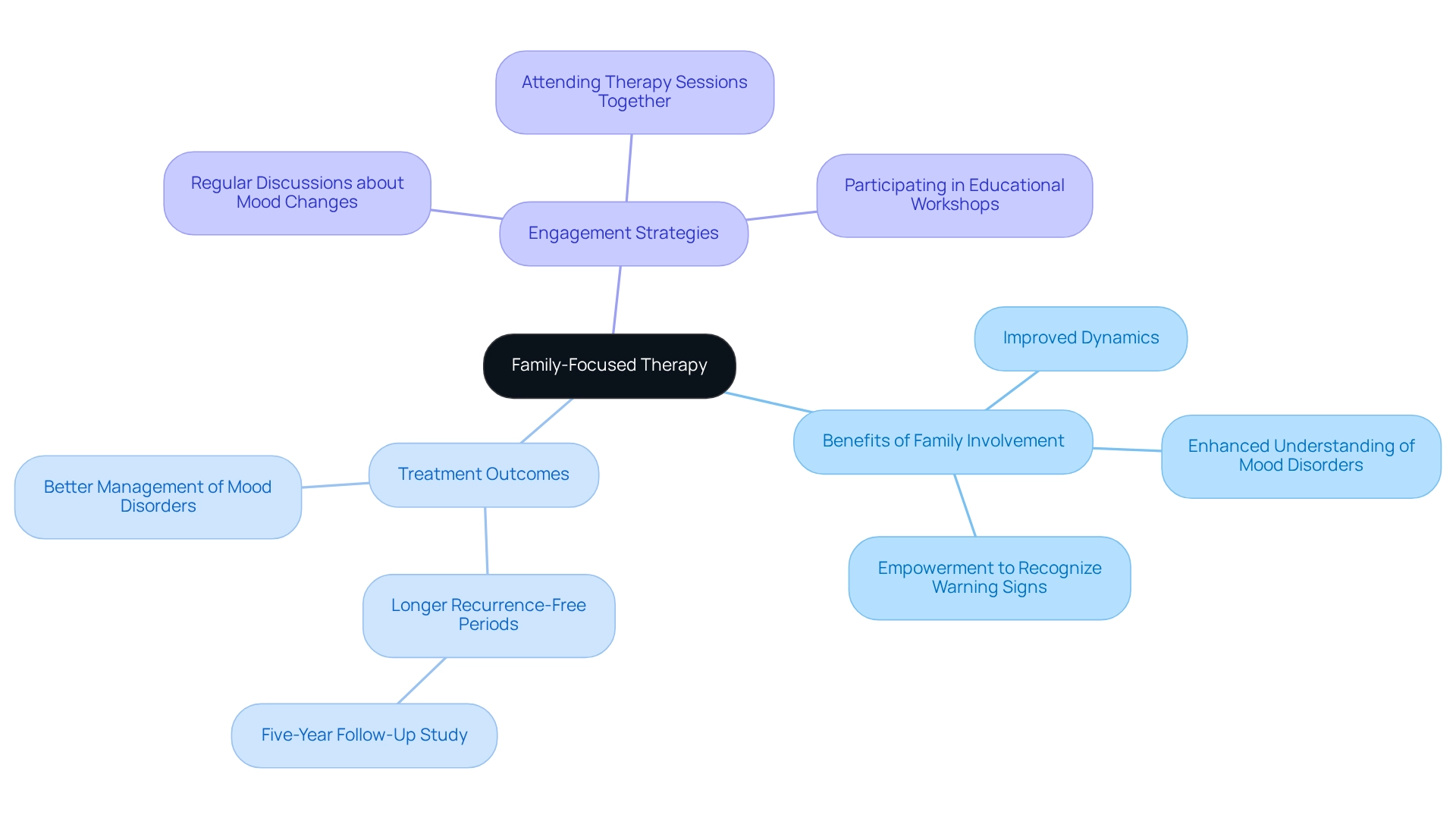
Psychoeducation: Empowering Individuals and Families in Bipolar Disorder
Psychoeducation serves as a vital foundation in the therapeutic journey at The Emerald Couch, providing individuals and their families with essential insights into bipolar disorder supportive therapy, including its symptoms, triggers, and management options. This educational framework empowers individuals to better understand their circumstances and fosters active participation in their care plans.
At The Emerald Couch, we begin with an intake session to collaboratively craft a personalized treatment plan that reflects what success looks and feels like for each individual. As we continue to work together, we regularly assess progress toward the goals we have established, emphasizing the importance of bipolar disorder supportive therapy. Understanding the complexities of mood disorders through bipolar disorder supportive therapy enables individuals to manage their symptoms more effectively and make informed decisions regarding their treatment, ultimately leading to improved outcomes.
Research underscores the significance of psychoeducation in managing mood disorders. A five-year follow-up study revealed that patients who engaged in group psychoeducation experienced notably longer intervals before mood episodes recurred, as well as fewer total recurrences. These findings illuminate the lasting benefits of such educational interventions. Furthermore, the Reinares study indicated that caregivers involved in bipolar disorder supportive therapy had fewer patients experiencing mood relapses, highlighting the positive impact of informed support systems on patient outcomes.
Current best practices for educating individuals about mood disorders encompass structured psychoeducation sessions that include follow-ups to assess the effectiveness of bipolar disorder supportive therapy. This approach not only enhances understanding but also nurtures resilience among patients. As Chiara Buizza noted, the data generated from these studies are crucial for ongoing research and improvement in therapeutic methodologies, emphasizing the importance of evidence-based practices in therapy.
As we look ahead to 2025, the role of psychoeducation in managing mood disorders continues to evolve, focusing on empowering patients through knowledge and adapting to new discoveries in the field. By equipping individuals with the tools to understand their circumstances and collaboratively developing care strategies, The Emerald Couch reaffirms its commitment to high-quality, evidence-based support, ensuring that individuals are well-prepared to navigate their mental health journeys.
Have you ever felt overwhelmed by your past? Remember, you are not alone, and support is available.
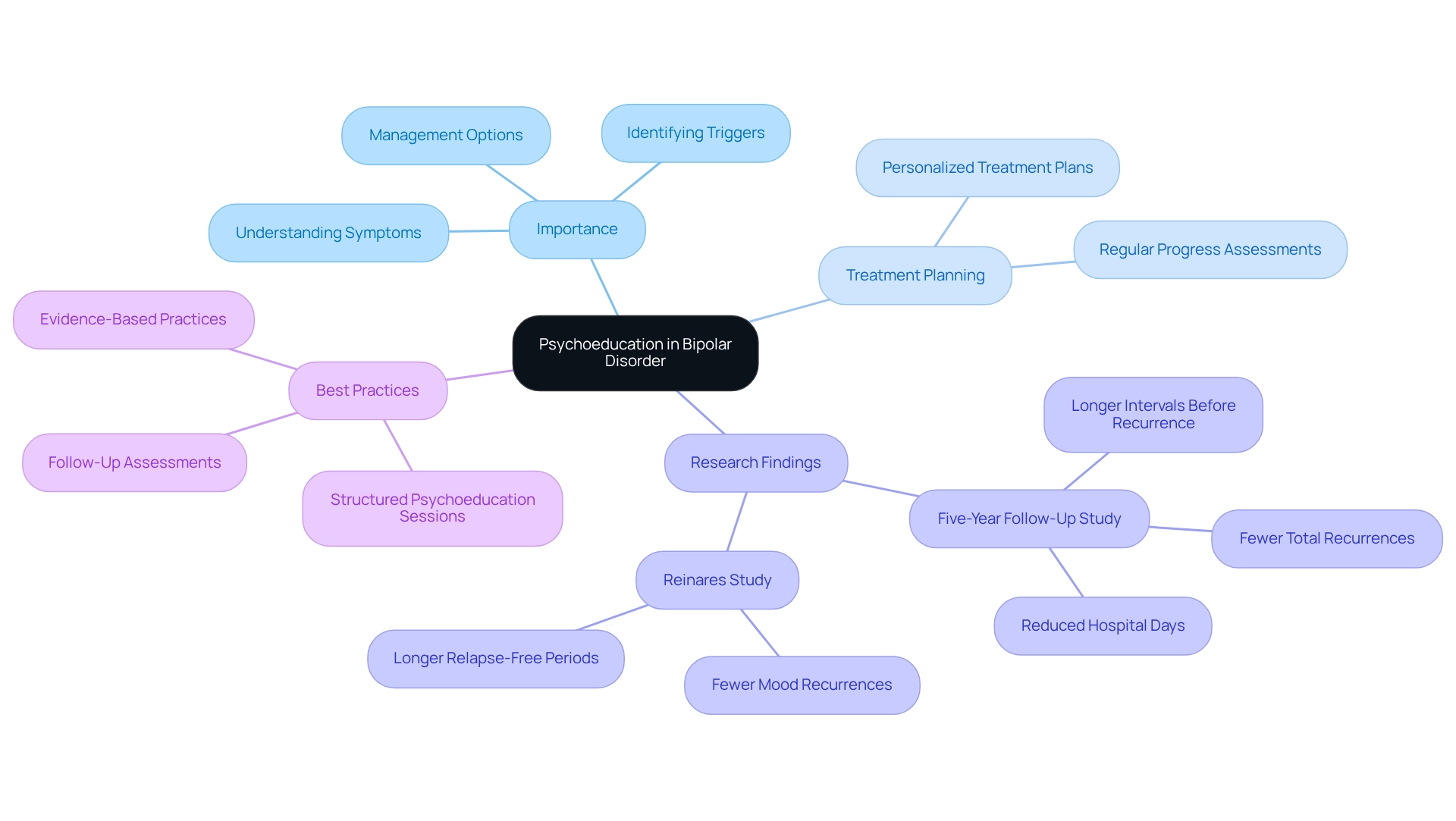
Coping Strategies: Tools for Managing Bipolar Disorder Effectively
At The Emerald Couch, individuals are gently introduced to a variety of effective coping strategies that are part of bipolar disorder supportive therapy, specifically tailored to manage their condition. These strategies include:
- Mindfulness techniques
- Journaling
- The establishment of healthy routines
All designed to enhance emotional regulation. During the initial intake meeting, therapists collaborate with individuals to gather essential information and create a personalized plan that outlines what success looks and feels like for each person. This compassionate approach ensures that clients have practical tools readily available during challenging moments, fostering resilience and empowering them to navigate their daily lives with greater confidence.
Research suggests that proactive involvement in care and self-management significantly enhances outcomes for mood disorders, highlighting the importance of these coping strategies. Have you ever felt overwhelmed by your past? Ongoing exploration of coping profiles in individuals with mood disorders is essential to refine treatment approaches. By equipping clients with these vital skills and regularly checking in on their progress, The Emerald Couch plays a pivotal role in supporting their journey towards emotional well-being.
As George C. Nitzburg, Ph.D., emphasizes, 'Future studies are needed to follow up and expand upon the present results to elucidate the impact of defeatist beliefs on functional outcomes in BD.' This underscores the significance of bipolar disorder supportive therapy in equipping individuals with valuable skills for coping with the condition and enhancing their relationships. Clients are encouraged to implement these strategies consistently and to communicate openly during check-ins, ensuring their treatment remains effective and responsive to their needs. Together, we can navigate this journey towards healing and emotional stability.
Mindfulness Practices: Enhancing Emotional Regulation in Bipolar Disorder
Mindfulness practices stand as a cornerstone of the therapeutic approach at The Emerald Couch, offering individuals essential techniques like meditation, deep breathing exercises, and body awareness to enhance emotional regulation. These practices nurture a greater awareness of thoughts and feelings, empowering individuals to respond to stressors with increased balance and composure. Have you ever felt overwhelmed by your emotions? Research indicates that mindfulness can significantly reduce the intensity of mood swings, leading to improved overall mental well-being. A study on mindfulness-based cognitive treatment for bipolar disorder supportive therapy revealed that 54.9% of participants continued to practice mindfulness formally at least once a week, with many reporting lasting benefits in relapse prevention and lifestyle changes.
Mindfulness serves as a powerful vehicle for building awareness of thoughts, feelings, and body sensations, helping individuals recognize patterns that may impact their mental health. As K. D. Neff noted in her research on the Mindful Self-Compassion program, mindfulness can enhance self-compassion, which is crucial for emotional regulation. By incorporating mindfulness into their daily practices, individuals not only develop resilience but also undergo a profound transformation in their ability to handle emotional variations, ultimately enriching their quality of life.
Furthermore, mindfulness practices can assist individuals in accepting criticism more gracefully and improving workplace productivity, offering a broader perspective on the benefits of these techniques. In addition to this, mindfulness is frequently integrated into therapeutic approaches such as dialectical behavioral therapy (DBT) and acceptance and commitment therapy (ACT), allowing individuals to practice these techniques both in therapy sessions and as part of their daily lives.
As we explore this further, consider how mindfulness could play a role in your journey towards emotional well-being.
Individualized Treatment Plans: Customizing Support for Bipolar Disorder
The Emerald Couch places a strong emphasis on personalized treatment plans for individuals seeking bipolar disorder supportive therapy, recognizing that each person's experience is unique. These plans are thoughtfully developed through a thorough evaluation that considers specific symptoms, personal history, and therapeutic objectives. This customized approach empowers therapists to apply interventions, such as bipolar disorder supportive therapy, that directly address individual needs, maximizing the effectiveness of the support offered. Incorporating mindfulness practices into these personalized plans can significantly enhance emotional regulation and personal growth. Have you ever felt overwhelmed by your thoughts and emotions? Mindfulness helps individuals cultivate awareness, enabling them to observe their experiences without judgment. This heightened awareness allows individuals to identify patterns that may influence their mental well-being, fostering a deeper understanding of their emotional reactions.
The healing process begins with an intake session, where therapists gather vital information to collaboratively create a personalized care plan. Frequent assessments and adjustments to the care strategy are essential, allowing for continuous alignment with the individual's evolving circumstances. This dynamic process not only enhances the significance of treatment but also nurtures a sense of empowerment, as individuals actively engage in their healing journey. Mindfulness techniques, such as meditation and aware breathing, can be integrated into counseling sessions as a form of bipolar disorder supportive therapy to help clients slow down and make intentional decisions about their responses, ultimately supporting their progress. Studies indicate that effective management of mood disorders often combines medicinal intervention with psychological methods, striving for stability and improved self-regulation. A case study highlights that approximately 6 million adults face challenges with bipolar disorder, emphasizing the importance of bipolar disorder supportive therapy and individualized care strategies. This statistic emphasizes the critical need for personalized approaches in bipolar disorder supportive therapy to address the diverse experiences of those affected by this disorder. As noted by Saxe et al., predictive models should focus on providing suggestions based on causal mechanisms rather than mere associations between variables, highlighting the importance of tailoring bipolar disorder supportive therapy to the individual. By prioritizing personalized care and integrating mindfulness, The Emerald Couch offers bipolar disorder supportive therapy to assist individuals in navigating their challenges, ultimately leading to improved outcomes in their mental health journey. Counseling provides individuals with resources to manage their emotions and cope with life's difficulties, further enhancing the effectiveness of customized care strategies. Additionally, understanding the availability of resources, including time and financial considerations, is crucial, as it can influence individuals' ability to engage fully in their care. Ongoing adjustments to treatment plans are necessary to address any challenges that may arise, such as substance misuse after treatment initiation, which can diminish the effectiveness of pharmacotherapy and exacerbate symptoms.
Ongoing Support: Ensuring Long-Term Success in Bipolar Disorder Management
Continuous support is essential to the bipolar disorder supportive therapy process at The Emerald Couch. Here, individuals are encouraged to engage in regular follow-up sessions, which are vital for monitoring progress and addressing any emerging challenges—fostering a sense of stability. Have you ever felt the need for ongoing support in your journey? Treatment typically begins with weekly sessions that incorporate bipolar disorder supportive therapy, allowing individuals to experience improvement as quickly as possible while addressing the initial introduction phase of the process. Research indicates that long-term treatment can significantly enhance outcomes for individuals with bipolar disorder. Studies show that consistent participation in counseling leads to better management of symptoms and overall life satisfaction. Notably, statistics reveal that DBSA participants reported a 20.8% lifetime arrest rate, underscoring the potential consequences of inadequate support. Additionally, individuals obtain resources and referrals to community support groups, broadening their network of assistance as they navigate their recovery journey.
This comprehensive approach not only strengthens the skills acquired during therapy but also enables individuals to uphold their mental health over time. Expert opinions underscore the importance of ongoing support, with therapists noting that follow-up sessions are crucial for sustaining progress and preventing relapse. As we explore this further, case studies reveal that individuals who actively engage in continuous support report higher levels of satisfaction with their treatment, correlating with a more positive outlook on their illness and coping abilities.
Moreover, challenges faced by DBSA participants in accessing resources highlight the necessity of ongoing engagement with available support. By prioritizing ongoing support, The Emerald Couch ensures that clients have the tools and resources necessary for effective management through bipolar disorder supportive therapy. As noted by the National Institute of Mental Health, when depressed, individuals may experience various physical complaints such as headaches and stomachaches. This emphasizes the need for continuous support to address these symptoms.
By fostering a supportive environment, The Emerald Couch contributes to a more positive outlook on illness and coping abilities. Remember, seeking help is a courageous step towards healing, and you are not alone in this journey.
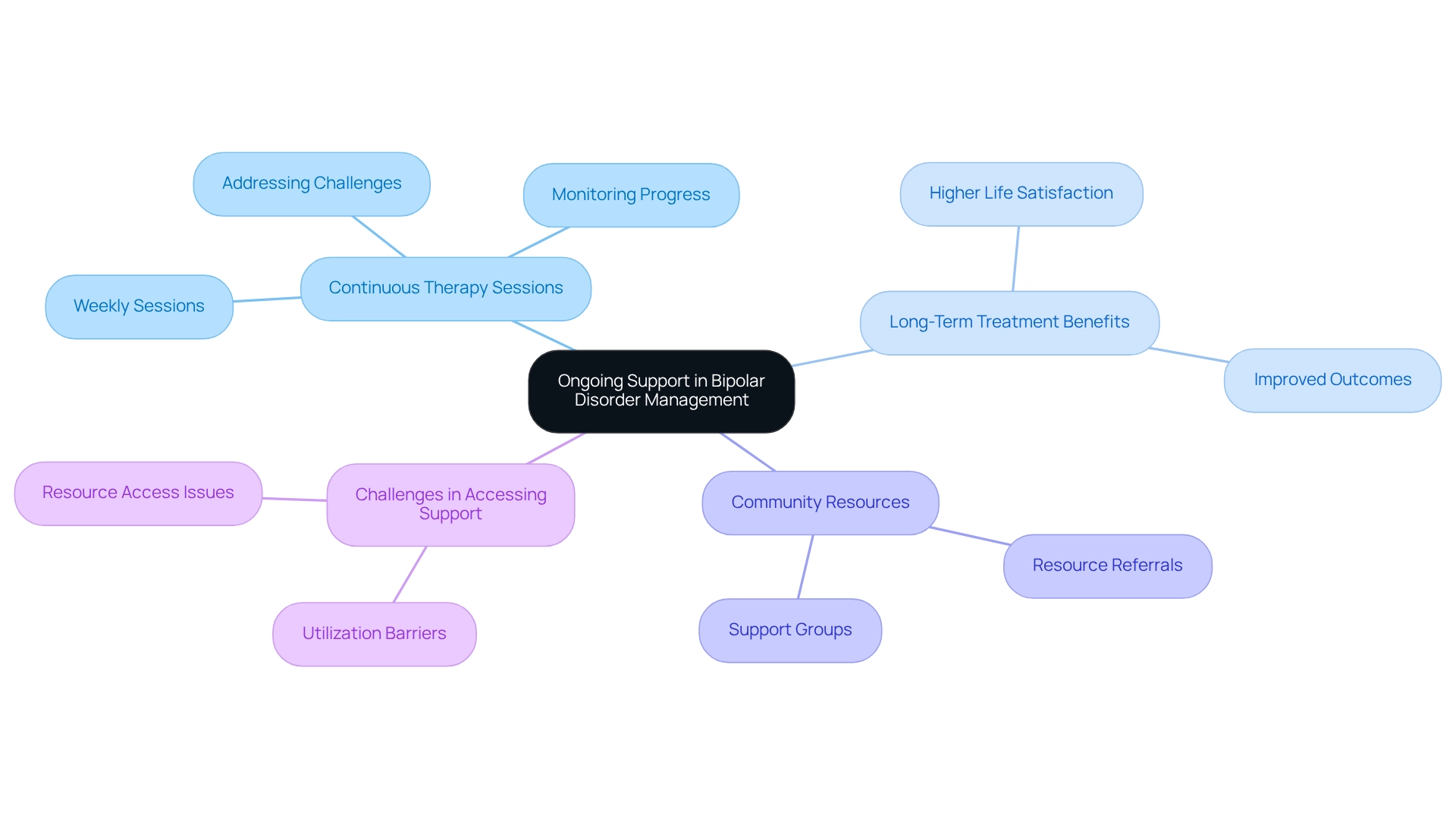
Community Resources: Expanding Support for Bipolar Disorder Recovery
The Emerald Couch highlights the vital role that community resources play in the recovery journey for individuals undergoing bipolar disorder supportive therapy. Have you ever felt the need for connection during challenging times? Engaging with local support groups, educational workshops, and wellness programs can significantly enhance your therapeutic experience, including creative methods like art activities. Art therapy, a unique form of psychotherapy, utilizes creative processes such as drawing and painting to help individuals express themselves and explore their emotions, fostering self-awareness and personal growth.
This process typically involves several key components:
- Assessment, where the therapist evaluates your needs and comfort with various media.
- Art-making, where you create art guided by the therapist.
- Reflection, where you discuss the artwork and the emotions it evokes.
- Interpretation, where the therapist helps you understand the meaning behind your creations.
Research shows that community support can greatly enhance treatment outcomes, fostering a sense of belonging and empowerment that is crucial for sustained recovery.
For instance, did you know that the prevalence of mood disorders among adolescent males stands at 2.6%? This statistic underscores the importance of accessible community resources tailored to younger populations. Furthermore, a notable 40-fold increase in bipolar diagnoses among children from 1994 to 2003 highlights the need for accurate diagnosis and the potential overlap with disorders like ADHD. By engaging with community resources, including art sessions, you can expand your support network and gain valuable tools and strategies for managing your condition effectively.
Art-based interventions offer various advantages, such as emotional release, stress alleviation, and enhanced self-esteem, all of which contribute to your overall mental well-being. As Hindell wisely notes, "Psychotherapy is needed to help gain insights into one’s patterns and moods, gaining awareness of when one becomes symptomatic." This holistic approach not only aids in symptom management but also cultivates resilience, making community involvement and creative expression invaluable aspects of bipolar disorder supportive therapy.
To start engaging with community resources effectively, consider researching local support groups and workshops that align with your recovery goals, including opportunities for art therapy that promote emotional healing and self-discovery. Remember, you are not alone on this journey—support is available, and taking that first step can lead to meaningful change.
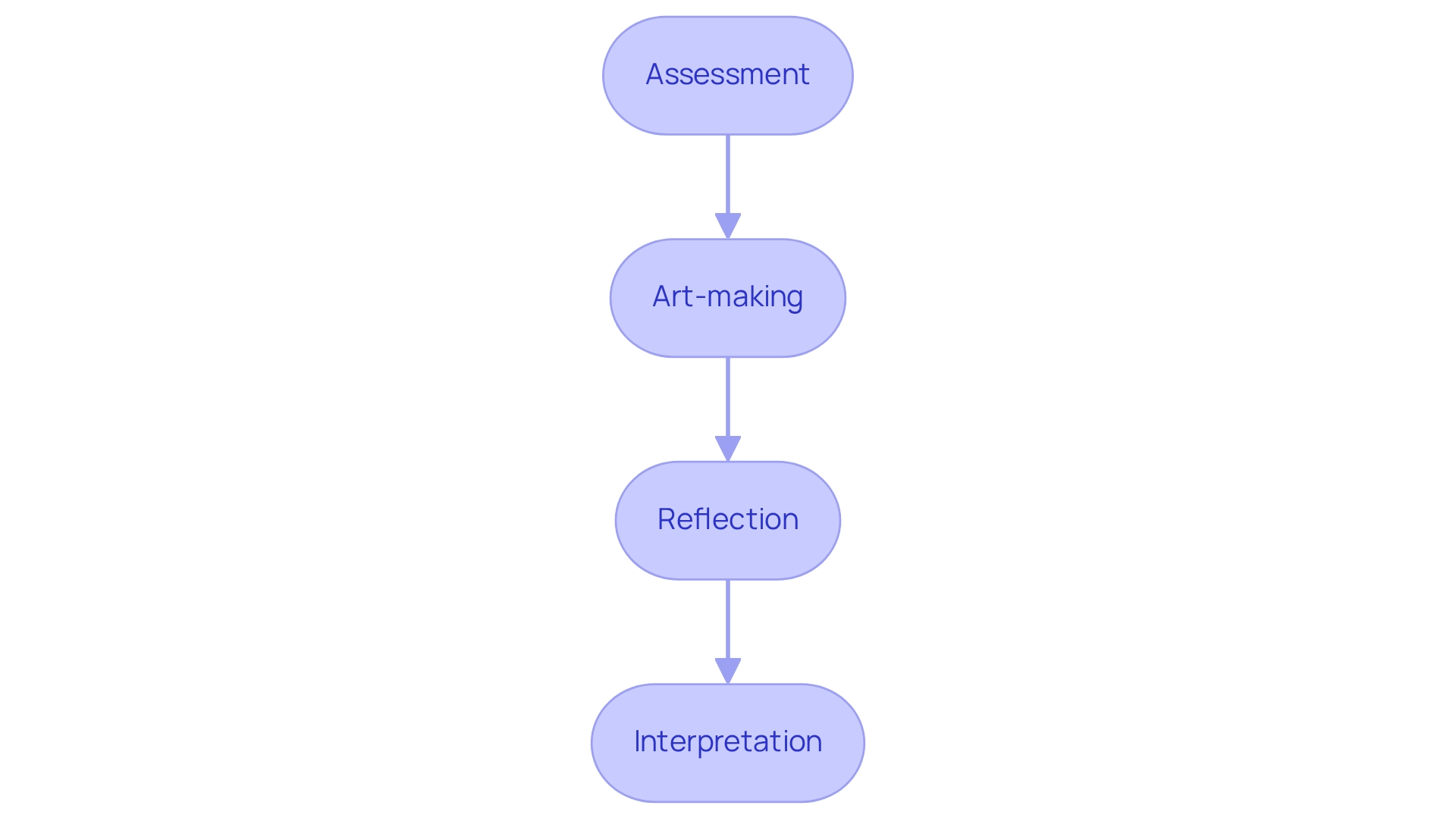
Conclusion
At The Emerald Couch, the therapeutic approach is distinguished by its unwavering commitment to individualized care for those navigating bipolar disorder. By crafting tailored treatment plans that weave together diverse methodologies—mindfulness practices, medication management, family-focused therapy, and psychoeducation—The Emerald Couch cultivates an environment that prioritizes healing and resilience. This comprehensive strategy not only addresses the unique challenges faced by clients but also empowers them to take an active role in their recovery journey.
Group therapy at The Emerald Couch plays an essential role in fostering a sense of community among clients, alleviating feelings of isolation, and enhancing emotional resilience. Participants learn from one another’s experiences while receiving guidance from trained therapists, creating a safe space for open dialogue. This collaborative approach has demonstrated improvements in treatment outcomes, underscoring the significance of supportive networks in managing bipolar disorder.
Moreover, the integration of ongoing support and community resources further bolsters the recovery process. Regular follow-up sessions ensure that clients remain engaged and equipped with the necessary tools to sustain their mental health over time. The emphasis on community involvement—through local support groups or innovative therapies like art therapy—enriches the therapeutic experience and promotes a holistic approach to mental wellness.
In conclusion, The Emerald Couch exemplifies how a multifaceted, individualized approach can effectively address the complexities of bipolar disorder. By prioritizing tailored support, community engagement, and ongoing education, clients are not only equipped to manage their symptoms but also empowered to navigate their recovery with confidence and resilience. This model of care highlights the essential role of compassion and understanding in the journey toward mental health stability.
Frequently Asked Questions
What is the approach of The Emerald Couch towards bipolar disorder supportive therapy?
The Emerald Couch adopts a caring and personalized approach, recognizing that each individual's journey with bipolar disorder is unique. Therapists conduct comprehensive assessments to develop tailored treatment plans that address the complexities of the disorder.
How does The Emerald Couch create a safe environment for therapy?
The Emerald Couch fosters a safe environment by encouraging individuals to explore their feelings and experiences without judgment. This supportive atmosphere is essential for healing and resilience, allowing individuals to actively participate in their recovery journey.
What techniques are incorporated into counseling sessions at The Emerald Couch?
Counseling sessions at The Emerald Couch incorporate mindfulness techniques, such as meditation and conscious breathing, to enhance emotional regulation and self-awareness.
How does group support contribute to bipolar disorder therapy at The Emerald Couch?
Group support provides a platform for individuals to connect and share their experiences, challenges, and coping strategies, fostering a sense of community and mutual understanding. This collaborative approach helps alleviate feelings of isolation and enhances coping skills.
What is the significance of personalized therapy in managing bipolar disorder?
Research indicates that personalized therapy can significantly improve adherence to care. Attending support group meetings can increase the likelihood of following through with care by approximately 86%.
How does The Emerald Couch address medication management for individuals with bipolar disorder?
The Emerald Couch emphasizes effective medication management by collaborating with individuals and their prescribing physicians to monitor medication effectiveness and make necessary adjustments, ensuring appropriate medications stabilize moods and reduce the risk of episodes.
What role does understanding genetic factors play in treatment at The Emerald Couch?
Understanding genetic factors linked to bipolar disorder aids in early detection and intervention, which is integrated into care strategies to provide personalized support.
How does The Emerald Couch promote a non-judgmental environment for clients?
The Emerald Couch is dedicated to dismantling the stigma associated with counseling, promoting a non-judgmental environment where clients feel comfortable discussing their challenges.
What are the benefits of group therapy sessions at The Emerald Couch?
Group therapy sessions can lead to improved outcomes in managing symptoms, with participants often reporting reduced levels of significant depression, mania, or anxiety symptoms.
What options are available for clients seeking therapy at The Emerald Couch?
The Emerald Couch offers adaptable counseling options, including in-person and virtual appointments, ensuring clients can access support in a manner that suits their lifestyle.




